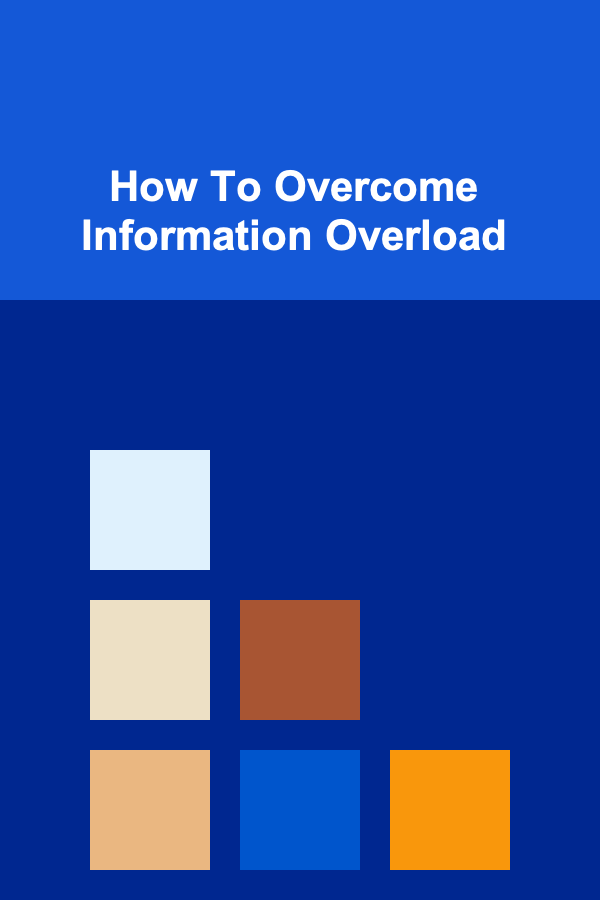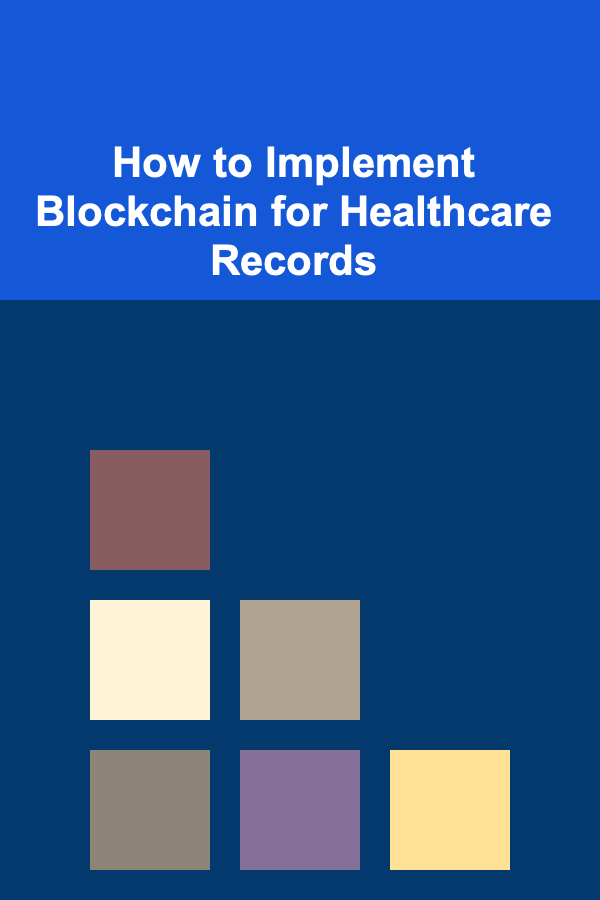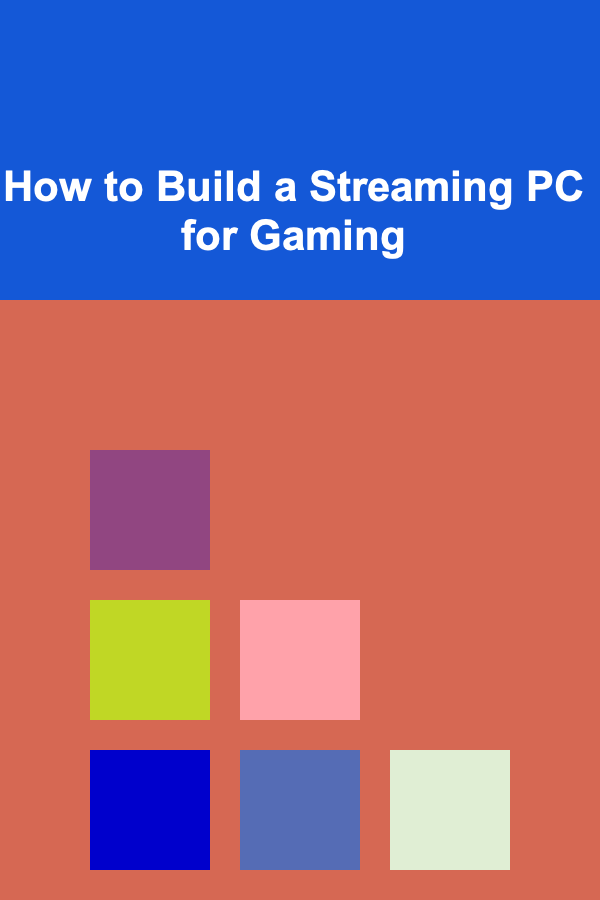
How To Overcome Information Overload
ebook include PDF & Audio bundle (Micro Guide)
$12.99$6.99
Limited Time Offer! Order within the next:

In today's world, we are constantly bombarded by a seemingly endless stream of information. From social media notifications and news alerts to academic papers and work emails, the data we encounter daily can quickly become overwhelming. The rise of the internet, mobile devices, and interconnected systems has made it easier than ever to access information, but it has also introduced the problem of information overload.
Information overload occurs when individuals are exposed to more information than they can process effectively. This phenomenon not only reduces productivity but can also lead to stress, decision paralysis, and cognitive fatigue. Overcoming information overload is not just about managing the quantity of information; it's about finding ways to process, prioritize, and curate information in a manner that enhances our well-being and decision-making abilities. In this article, we will explore strategies to help manage and overcome information overload, offering practical advice on how to streamline the information we consume while maintaining mental clarity and productivity.
Understanding Information Overload
Information overload is often described as the condition in which the volume of information we are exposed to exceeds our ability to process and make sense of it. The issue has been around for centuries, but it has become particularly pronounced in the digital age. Technological advancements, such as smartphones, social media platforms, and instant messaging, have made it easier for information to reach us at any given moment. According to research, the average person is exposed to as many as 34 gigabytes of information every single day. This figure includes emails, texts, news, advertisements, and a variety of other data.
However, the sheer quantity of information is not the only problem. The rapid pace at which information is generated, combined with the continuous demand to stay connected and updated, creates an environment where individuals are left feeling overwhelmed and unable to focus on what truly matters.
The consequences of information overload are far-reaching. Studies have shown that it can lead to a decrease in productivity, increased stress levels, difficulty making decisions, and even burnout. With the constant influx of data, it can be difficult to filter out what is important and avoid getting distracted by irrelevant or trivial information.
To overcome information overload, we must first understand the key factors contributing to it and recognize its impact on our mental and emotional well-being.
The Psychological Effects of Information Overload
Information overload doesn't just affect our cognitive abilities---it can have significant psychological and emotional effects as well. These effects are often linked to feelings of stress, anxiety, and even depression. Here are some of the psychological consequences of being exposed to excessive information:
1. Decision Paralysis
When presented with too much information, individuals often experience decision paralysis. This occurs when they are unable to make a choice or take action due to the overwhelming amount of options available. The fear of making the wrong decision increases as the volume of information grows, leading to inaction or poor decisions. Decision paralysis can be particularly harmful in both personal and professional contexts, as it can cause individuals to avoid making important choices altogether.
2. Reduced Attention Span
Constant exposure to fragmented, bite-sized pieces of information, such as social media posts, text messages, and notifications, can shorten our attention span. The rapid switching between tasks or sources of information makes it difficult to concentrate on one thing for an extended period of time. This shift in attention can reduce the quality of work and impair deep thinking and problem-solving abilities.
3. Cognitive Overload
Cognitive overload happens when the brain becomes overwhelmed by the sheer volume of data it is trying to process. This can result in feelings of mental fatigue, difficulty focusing, and decreased memory retention. Over time, chronic cognitive overload can lead to burnout and reduced cognitive performance.
4. Increased Stress and Anxiety
Constantly being bombarded by new information can trigger the body's stress response. Information overload often leads to heightened anxiety levels, as individuals feel pressured to stay updated and respond to every notification. The need to keep up with fast-moving trends and breaking news can feel like a never-ending race, which can negatively affect mental health.
5. Decreased Productivity
Despite the constant influx of information, more data does not always translate into better decision-making or increased productivity. In fact, information overload can reduce efficiency by causing distractions, impairing focus, and making it difficult to filter out irrelevant information. This leads to longer decision-making times and decreased output.
Practical Strategies for Overcoming Information Overload
The good news is that there are several effective strategies for overcoming information overload. By implementing some of the following techniques, we can regain control over the information we consume and improve our overall well-being.
1. Set Clear Priorities and Goals
One of the first steps in managing information overload is to set clear priorities and goals. Having a clear sense of purpose helps you decide what information is worth consuming and what can be ignored. Without clear goals, it is easy to get caught up in irrelevant or distracting data.
Take some time to reflect on your personal or professional goals. What do you want to achieve in the short and long term? Once your goals are clear, you can focus on gathering information that supports those objectives and dismiss irrelevant data. Prioritization enables you to sift through the noise and concentrate on what matters most.
2. Practice Information Dieting
An information diet involves consciously limiting the amount of data you consume on a daily basis. This strategy encourages selective consumption of information by eliminating unnecessary or distracting sources. Similar to how a healthy diet involves avoiding excess sugar or unhealthy food, an information diet involves limiting exposure to excessive or low-value information.
To implement an information diet, take the following steps:
- Identify sources of overload: Reflect on which sources of information are contributing to your overload. These might include social media platforms, email newsletters, or news websites.
- Limit consumption time: Set specific time slots for checking emails or social media, and stick to them. Avoid constantly checking notifications throughout the day.
- Unsubscribe and unfollow: Clean up your digital environment by unsubscribing from irrelevant newsletters and unfollowing social media accounts that don't contribute to your well-being or goals.
3. Utilize Digital Tools for Organization
Technology itself can be an ally in managing information overload. There are several digital tools available to help you organize, filter, and prioritize the information you receive. These tools can help streamline your workflow and keep distractions at bay.
Some popular digital tools include:
- RSS Feeds: Rather than visiting multiple websites for updates, you can use RSS readers to aggregate all the relevant content in one place. Tools like Feedly allow you to subscribe to specific topics or websites and receive daily summaries of new posts, making it easier to stay informed without getting overwhelmed.
- Task Management Apps: Tools like Todoist, Asana, or Trello help you organize tasks, set deadlines, and track progress, reducing mental clutter and enabling better focus.
- Email Filters and Folders: Use filters and folders in your email account to automatically sort incoming messages by category (e.g., personal, work, urgent). This way, you can focus on what matters first and avoid the overwhelm of a crowded inbox.
4. Engage in Mindful Consumption
Mindful consumption of information involves being conscious of the types of data you engage with and the impact it has on your mental state. It's important to take a step back and assess how different types of information make you feel. Are certain sources of information increasing your anxiety or stress levels? Are you spending too much time on social media at the expense of real-life interactions?
Mindful consumption encourages being more intentional with the information you take in. Some strategies for mindful consumption include:
- Limit screen time: Set boundaries on the time you spend in front of screens. Consider using apps that track your screen time and alert you when you've exceeded your limits.
- Avoid information overload before bed: Many people engage with news or social media right before bedtime, which can contribute to poor sleep. Try to avoid consuming information at least an hour before bed to allow your brain to wind down.
- Engage in activities that promote relaxation: Practices such as meditation, journaling, or spending time in nature can help you clear your mind and reduce the mental clutter caused by information overload.
5. Adopt the "Less is More" Philosophy
The idea of "less is more" emphasizes the importance of quality over quantity. Rather than consuming a large volume of information, focus on curating a smaller selection of high-quality sources that contribute meaningfully to your life. This allows you to dive deeper into subjects that truly matter, rather than skimming over a broad array of superficial content.
To apply this philosophy, consider:
- Curating your news sources: Instead of trying to keep up with every piece of news, follow a few trusted sources that offer in-depth analysis and balanced reporting.
- Focusing on long-form content: Rather than consuming multiple articles, opt for long-form books, documentaries, or podcasts that provide more comprehensive insights into topics of interest.
- Engaging in deeper learning: Instead of jumping from one topic to another, focus on mastering one subject at a time. This approach fosters a deeper understanding and helps reduce the feeling of being overwhelmed.
6. Take Regular Digital Detoxes
A digital detox involves disconnecting from all digital devices for a set period of time to reset your relationship with technology. This practice allows you to take a step back from the constant influx of information and regain mental clarity.
To incorporate digital detoxes into your routine:
- Set boundaries on device usage: Designate specific times when you will be device-free, such as during meals or before bed.
- Take weekend breaks: Set aside entire weekends where you refrain from checking emails, social media, or news updates.
- Go for nature walks or engage in hobbies: Spend time offline engaging in activities that bring you joy and relaxation, like hiking, painting, or reading.
Conclusion
Information overload is a growing challenge in today's digital age, but it is not insurmountable. By understanding its effects and implementing practical strategies, we can regain control over the information we consume and protect our mental and emotional well-being. Setting priorities, practicing mindful consumption, utilizing digital tools, and taking regular breaks from technology are just a few of the ways we can navigate this modern dilemma. Ultimately, overcoming information overload requires intentionality, self-awareness, and a commitment to balancing the digital and physical worlds in a way that promotes health, productivity, and happiness.

How to Create a Profitable Mail Order Business From Home
Read More
How to Evaluate Fixer-Upper Properties for Investment
Read More
How to Use Language Learning Apps to Make Money
Read More
How to Implement Blockchain for Healthcare Records
Read More
How to Build a Streaming PC for Gaming
Read More
How to Develop a Time Management System That Works for You
Read MoreOther Products

How to Create a Profitable Mail Order Business From Home
Read More
How to Evaluate Fixer-Upper Properties for Investment
Read More
How to Use Language Learning Apps to Make Money
Read More
How to Implement Blockchain for Healthcare Records
Read More
How to Build a Streaming PC for Gaming
Read More